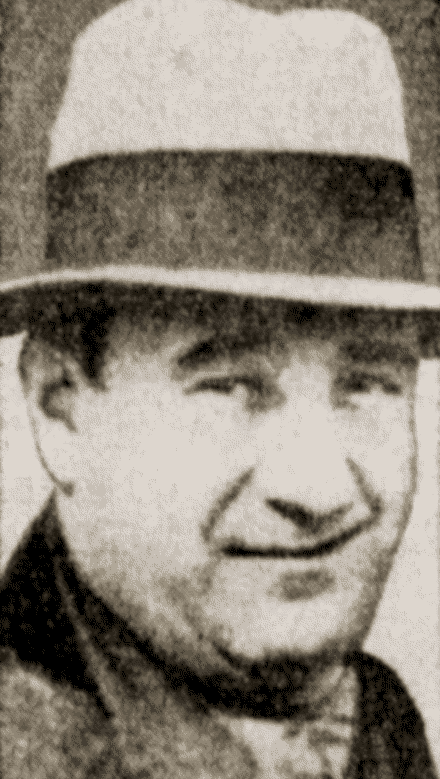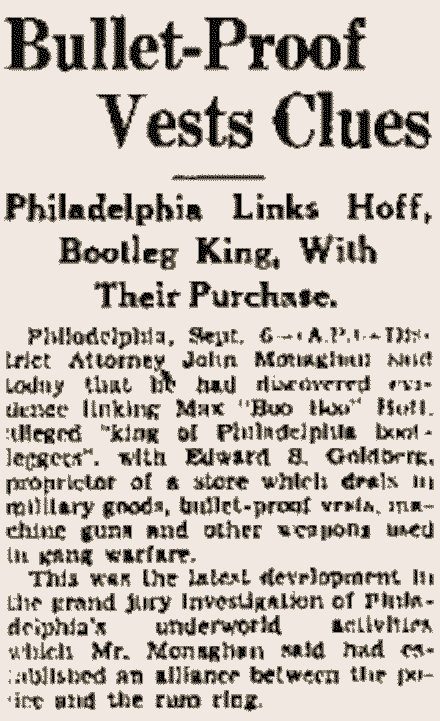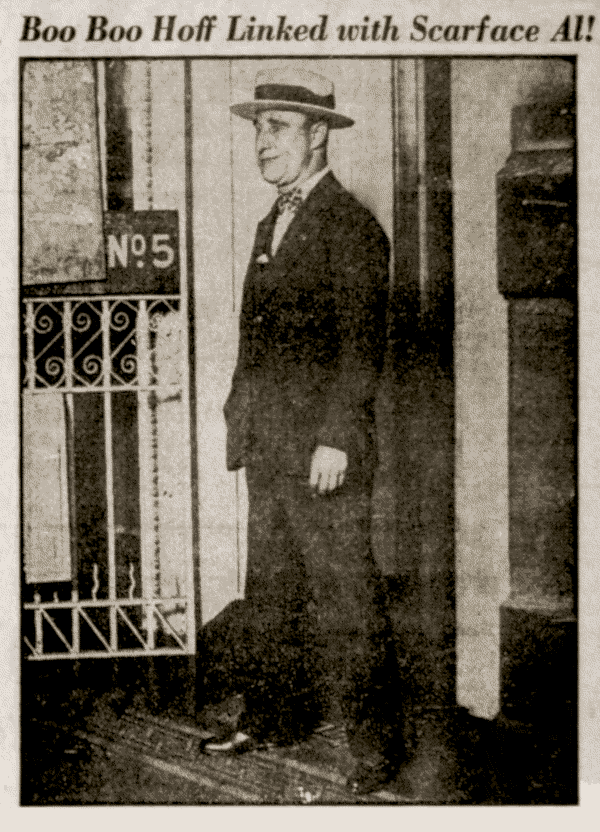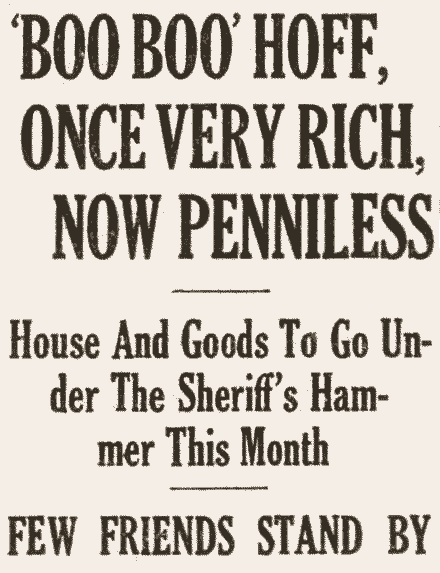

Max "Boo Boo" Hoff was born in 1893 in South Philadelphia, a son of poor Russian-Jewish, immigrants. After quitting school, Boo Boo worked for several years as a cigar store clerk. His salary allegedly was raised from $12 a week to $15 after the proprietor noticed how Boo Boo's amiable personality appealed to customers.

Max Hoff
But Boo Boo wanted to be his own boss. So, in 1917, he started a gambling operation in the section of Philadelphia now known as Society Hill. There was a poolroom on the first floor and a dice game usually was going full blast upstairs.
Although he used his involvement in boxing as a front for his other activities, boxing played an important role in Boo Boo's life. In the late 1920s, he had the largest stable of prizefighters in the nation, and he staged boxing matches for many years at several sites in Philadelphia. None of the boxers won a world championship, but several were highly ranked contenders in a period when boxing was a widely popular form of sports entertainment. Boo Boo's stable of boxers became Max Hoff Inc. in 1928. It was the first group of fighters in the nation to be incorporated.
One of Boo Boo's most publicized ventures in boxing was the $350,000 lawsuit he filed against Gene Tunney and his manager, Billy Gibson, in 1927. The suit was based on a disputed agreement, which Hoff claimed was signed by Tunney and Gibson the day before Tunney's first fight with the heavyweight champion, Jack Dempsey, in 1926. Tunney won the historic battle, fought in a driving rainstorm before a crowd of more than 120,000 fans - including six governors and three cabinet secretaries - at Philadelphia's Sesquicentennial Stadium (subsequently known as Municipal Stadium and JFK Stadium before it was razed).
Boo Boo said he loaned Tunney and Gibson $20,000 as an advance to bind an oral agreement. Tunney and Gibson allegedly needed money right away because they owed thousands of dollars to Tex Rickards, who promoted the fight and had loaned them money to cover training and other expenses. The deal called for Boo Boo to receive 20 percent of Tunney's championship fight earnings and to be joint-manager, with Gibson, in exchange for the loan.
According to newspaper accounts, Hoff and Gibson signed the contract, but Tunney wrote "Eugene Joseph Tunney" on the document. His real name was James Joseph Tunney.
Despite his insistence that he had a strong case, Boo Boo mysteriously dropped the suit in 1931, reportedly without discussing a possible settlement with Tunney's lawyers.

Was Hoff equipping a bootleg army?
Boo Boo kept a lower profile with his other activities until the late 1920s. Although he had made his first million from small-time gambling operations while he was still in his twenties, it wasn't until the Prohibition Era, 1919 to 1933, that he and his cronies made a fortune by taking advantage of opportunities offered by the Volstead Act and corruption of police, political and banking officials.
Hoff's bootlegging operation included an office with 175 phones and a weekly payroll of $30,000 in 1920s dollars.
Illegal booze manufacturing and distribution operations were netting Boo Boo's syndicate an estimated $5 million annually by the late 1920s. Transposed into current dollars, those profits would add to more than $50 million today.
Boo Boo enjoyed the good life that went with being one of the nation's richest gangsters. He hosted elaborate parties, where stars of the sports and entertainment world partied with his cronies.
One New Year's Eve, he rented a hotel ballroom for a party in honor of Al Jolson, a top Broadway entertainer at the time and the star of "The Jazz Singer," the first "talkie" moving picture. The doors to the ballroom were opened to anyone in evening clothes, and Boo Boo reportedly didn't know half of the hundreds of guests who showed up.
Boo Boo never smoked or drank. His idea of fun at parties was to shoot tiny tinfoil pellets at guests with a rubber band. He paid a boy to keep him supplied with the pellets. Some said he could hit a target from as far away as 50 feet.
Philadelphians found out about his bootlegging operation when they read daily newspaper accounts of the Grand Jury investigation, conducted over a seven-month period in 1928 and 1929. Boo Boo, who wore a different outfit each of the eight times he was called to the stand, was one of 748 witnesses who testified. Although Boo Boo insisted that he "was never connected to the liquor industry in any way, shape or form," Philadelphia District Attorney John Monaghan characterized him as "King of Philadelphia's Bootleggers" during the investigation.

Hoff was linked to Al Capone
Despite mountains of circumstantial evidence against him, Boo Boo wasn't indicted because he "had scrupulously avoided signing any documents connected to the undercover operations," according to a New York Times reporter.
Here are just a few details that were revealed by the Grand Jury investigation:

A New York Times reporter noted that Boo Boo "was often arrested but never jailed, often accused but never convicted." However, Boo Boo's luck ran out, especially after Prohibition was repealed in 1933. The IRS sued him for $21,000 in unpaid income taxes; his home in the Cobbs Creek Park area was sold by the sheriff for $1,500, and his car was sold to cover $240 in back garage rent. It had a bullet hole in it.
Also, he was arrested at Philadelphia's 30th Street Station for allegedly attempting to pass a counterfeit $20 bill. Although he also was accused of tearing up several thousand dollars and washing them down a drain in the station's lavatory, he was acquitted.
And hard luck forced him to sell his last entertainment venture, an ice cream parlor known as the Village Barn, near the University of Pennsylvania campus.
"All I want," he had recently told a friend, "is to leave enough to support my wife and children comfortably. That's all."
Boo Boo died broke on April 27, 1941, at the age of 48. His second wife, Margaret, found his body in the bedroom of their West Philadelphia home.
His death was initially suspected of being a suicide because an almost-empty bottle of sleeping pills, which he had been taking for three years, was found on a table near the bed. However, an autopsy determined that he died of a heart ailment.
The author is constantly on the lookout for information relating to Max Hoff. If you have additional information, please contact him at Parry37@aol.com.